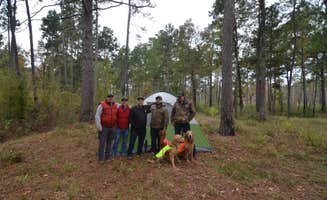Primitive camping near Rusk, Texas presents opportunities for backcountry experiences within the pine forests of East Texas. The region sits at elevations between 200-400 feet above sea level with a humid subtropical climate characterized by hot summers and mild winters. Winter camping is often more comfortable with temperatures averaging 40-60°F, while summer camping requires preparation for humidity and temperatures frequently exceeding 90°F.
What to do
Hunting opportunities: During designated seasons, Slay Creek serves as a hunter's base camp. "It's a Primitive camping area for Hunters during hunting season. There are no water or electrical hook-ups, but they do have two port-o-potties," notes camper David T.
Hiking trails exploration: The best tent camping near Rusk, Texas often connects to trail systems within wildlife management areas. Campers can venture from Walnut Creek Backcountry Site to explore unmarked paths. The site requires hiking in, making it ideal for those seeking solitude away from vehicle access points.
Wildlife observation: Set up at Alabama Creek Wildlife Management Area where the natural habitat supports diverse bird and animal species. The primitive setting allows campers to observe wildlife in their natural environment, particularly during early morning and evening hours when animals are most active.
What campers like
Secluded spots: Many tent camping locations near Rusk offer privacy when you know where to look. "This is a fairly basic primitive hunting camp, directly next to a road... but is actually pretty cool if you venture off into the woods a bit more," David S. mentions about Slay Creek.
Well-maintained grounds: Alazan Bayou provides some of the better-maintained primitive sites. "At least 14 sites with picnic tables on concrete slabs. Fire rings and Lantern poles. Very well kept and mowed," reports camper David T., noting the attention to basic amenities despite the primitive designation.
Peaceful atmosphere: The tranquility draws campers seeking escape from urban environments. Daniel L. describes his experience at Slay Creek: "Primitive hunting camp area we enjoyed the nice and quiet area."
What you should know
Permit requirements: Most tent camping areas near Rusk require permits. "You need a Texas parks Limited use permit. It costs as little as $12 a year. If you want to fish or hunt the price goes up a little. Can be used to stay at any National Forest or Wild Management area," explains a camper at Alazan Bayou.
Limited facilities: Prepare for minimal or no amenities at most sites. HFR Campsites & Retreats offers trash service but lacks drinking water and toilet facilities. Other areas provide even fewer amenities, requiring complete self-sufficiency.
Road access considerations: Many primitive camping areas feature unpaved access roads that can become challenging after rainfall. Four-wheel drive vehicles may be necessary during wet conditions to reach sites like Alabama Creek Wildlife Management Area.
Tips for camping with families
Choose sites with basic structure: When tent camping with children near Rusk, consider sites with minimal infrastructure. "There is a loafing barn for horses," notes a visitor to Alazan Bayou, which provides shelter options during unexpected weather changes.
Plan for no water access: Families should pack sufficient water for drinking, cooking, and basic hygiene. No drinking water is available at Decker Hill Park, despite having toilet facilities and trash service.
Pack insect protection: The East Texas climate supports active insect populations, particularly during warmer months. Mosquito repellent, screened tents, and protective clothing are essential for comfortable family camping experiences.
Tips from RVers
Limited RV accessibility: Most tent camping areas near Rusk are not designed for RVs. The primitive sites lack hookups and often have limited turning radius for larger vehicles. Tent camping remains the primary accommodation type at these locations.
Generator restrictions: Before planning to use power equipment, verify restrictions. Camp Meisenbach prohibits generators, making it unsuitable for RVers requiring electrical support for equipment.
Alternative parking options: RV campers can sometimes park at nearby designated areas and hike to tent sites. "I followed the road/trail in for a while. Probably a game management route, but there were a number of good spots off on the side where you can set up," notes David S. about exploring beyond the main parking area at Slay Creek.


